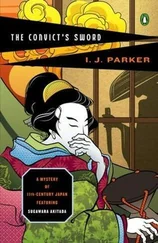I. Parker - The Crane Pavillion
Здесь есть возможность читать онлайн «I. Parker - The Crane Pavillion» весь текст электронной книги совершенно бесплатно (целиком полную версию без сокращений). В некоторых случаях можно слушать аудио, скачать через торрент в формате fb2 и присутствует краткое содержание. Жанр: Исторический детектив, на английском языке. Описание произведения, (предисловие) а так же отзывы посетителей доступны на портале библиотеки ЛибКат.
- Название:The Crane Pavillion
- Автор:
- Жанр:
- Год:неизвестен
- ISBN:нет данных
- Рейтинг книги:5 / 5. Голосов: 1
-
Избранное:Добавить в избранное
- Отзывы:
-
Ваша оценка:
- 100
- 1
- 2
- 3
- 4
- 5
The Crane Pavillion: краткое содержание, описание и аннотация
Предлагаем к чтению аннотацию, описание, краткое содержание или предисловие (зависит от того, что написал сам автор книги «The Crane Pavillion»). Если вы не нашли необходимую информацию о книге — напишите в комментариях, мы постараемся отыскать её.
The Crane Pavillion — читать онлайн бесплатно полную книгу (весь текст) целиком
Ниже представлен текст книги, разбитый по страницам. Система сохранения места последней прочитанной страницы, позволяет с удобством читать онлайн бесплатно книгу «The Crane Pavillion», без необходимости каждый раз заново искать на чём Вы остановились. Поставьте закладку, и сможете в любой момент перейти на страницу, на которой закончили чтение.
Интервал:
Закладка:
The picture that emerged was very unpleasant. Saburo developed an intense hostility toward Nakamura. Men like that deserved killing. In fact, the killer had done his fellow citizens a big favor by ridding the world of the man. Perhaps a few, like Jinzaemon and a handful of aunties and harlots regretted his passing, but for the rest things must be looking up.
And even the women in the quarter might feel a relief. According to Genzo. Nakamura had enjoyed inflicting pain. Mrs. Ozaki was well-informed about Nakamura’s household. He lived in the fourth quarter in a fine merchant’s house he had bought a few years ago. A small curio shop in the front catered to the nobility by offering high-priced art objects, but Nakamura’s money mostly came from the loans he extended to people.
“Any chance he might have creditors among the good people?” Saburo asked Mrs. Ozaki.
“Creditors?”
“People who owe him money.”
She looked vague. “Maybe. I wouldn’t know.”
Genzo said, “He did most of his business in the quarter and on the market. The shop is run by his son.”
“What about his family? A rich man has many wives and sons. What are they like?”
Mrs. Ozaki downed another cup of wine. “No wife. She died. At his age, he likes the harlots much better. He has a son and three daughters. The son’s married. They say the daughters are very ugly, but two have husbands. I expect that cost him dearly. The third keeps house for her father. It’s not a big job. He’s never home. In the daytime he goes about making money, and the night he spends with the whores.”
Genzo chuckled. “What a life!”
Mrs. Ozaki snapped, “It got him killed, didn’t it? So you’d best think again.”
Genzo protested, “It wasn’t the money or the sex that got him killed. It was a clumsy shampoo girl. He should’ve grown a beard.” He felt his own clean-shaven chin. “Maybe I’ll grow one myself.”
They laughed at him. Mrs. Ozaki cried, “Too late for you, unless you can grow more than hair.” This amused her so much she fell into choking giggles and had to have her back thumped by Saburo.
Genzo raised an admonitory finger. “Don’t trust a woman, Saburo, even if she’s borne you seven children.”
Struck by the truth of this saying as much as by the fact that his guests were getting into a drunken quarrel, Saburo paid for the wine and left.
9
The next morning, Akitada felt a great yearning to go to Tamako’s room and sit there, thinking of her, talking to her, perhaps telling her about the suicide of Lady Ogata and about the strange characters he had met that day.
Alas, it was not to be. Even this intangible bond with his wife was denied him. He went to his own room when he got home. It was blessedly empty of Saburo, but here the deepest darkness seemed to reside, a loneliness so profound that he could not bear it any longer.
He stepped out onto his narrow veranda. The weather had turned. The sky was clouded over and the scent of rain hung in the air. The garden was still lush with foliage, a small bird darted at a worm and flew off, and a few gnats still danced above the fish pond. It was late in the year, and soon the bird would huddle on a branch, shivering in the cold. A fish jumped for the gnats, but the pond, too, would become still and dark, and the fish would burrow into the muddy bottom.
He spotted something white on the side of the pond and went to investigate. It was a dead koi . He bent to pick it up by its tail and saw that it was a female. Laying it gently among some of the ferns, he took it as another omen that death would walk beside him from now on, that, even though at a great distance from Tamako when she died, he had become contaminated by death. His Shinto faith forbade physical closeness to death and dying, but it struck him that a physical closeness between two people in life must necessarily mean that one person’s death would touch the other. So it had been when he had lost his first son.
He stared at the dead fish, then went to move one of the rocks behind the pond. Using his bare hands to make a shallow hole in the soft earth underneath, he laid the fish in it. Then he replaced the rock.
He had missed Tamako’s funeral.
The day they returned from Kyushu, his sister Akiko and her husband Toshikage had arrived before Akitada had been able to do more than greet his children and flee to his room. In the weeks of travel, he had tried to prepare himself for this homecoming. He had built a shell around his heart, impervious to the raw emotions he would encounter and feel. It had not worked. When he had stepped out onto the veranda, grief had seized him so violently that he had been forced to grasp hold of the support beam or his knees would have buckled.
Akiko had burst in at that moment, crying out her pity for him, clasping him in her arms, looking him over, informing him that he looked dreadful, and then she had sat him down to describe in detail Tamako’s death and the subsequent decisions she had made for a proper funeral, complete with procession and cremation at Toribeno.
He had somehow borne it, saying nothing, trying to shut out her voice, and yet hearing words that would haunted him forever. He should be grateful to his sister for performing these duties in his absence, but he could not bring himself to thank her. Toshikage had finally interrupted her steady flow of chatter, saying, “My dear, Akitada looks dreadfully tired. We must let him rest now.”
Months had passed since then, and his grief had not become less.
He dusted the dirt off his hands, rinsing them in the pond, when Tora’s voice startled him.
“Sorry, sir, but you didn’t hear me. There’s a visitor.”
Akitada straightened, drying his hands on the lining of his full sleeves.
Beside Tora stood a short gentleman, who was, for such a young man, very properly and formally dressed in black robe and trousers and soft hat. Someone with a message from the ministry? Or something even worse? A summons before the board of censors?
He was a little surprised how calm he was. There was a time when the expectation of a reprimand from his superiors would have had him in a cold sweat. Now he just looked at the young official and nodded.
The young man bowed rather deeply for someone bringing bad news. “My name is Motonari, your Excellency. Superintendent Kobe has asked me to present myself. He said you might need a tutor for your children.”
“Ah, yes. Yes, he did mention it. It will be temporary only. I cannot well deprive him of you permanently. Let’s go inside and sit down.” Akitada glanced at Tora, who left.
He sat down behind his desk, and the young man took a seat opposite him. Akitada noticed for the first time the thick layer of dust covering his desk, his writing utensils, and assorted papers and books. He felt a little ashamed. The young man waited expectantly.
“I have a daughter, Yasuko, who is eight. She writes and reads moderately well. My son, Yoshitada, is only five. I’ve been absent and don’t know how much schooling he’s had. How old are the superintendent’s children?”
The young tutor bowed. “I only teach the boys. At present, I have five pupils. His Excellency’s oldest son is twelve, his second son is ten, his third son is also ten, his fourth son is eight, and his youngest is seven. I have taught them now for nearly a year.” He paused and added, “Ever since I graduated from the university.”
Akitada digested this information. For all that Kobe and he had become good friends over the years-after rather stormy beginnings-he had been unaware of the superintendent’s thriving family. Like most men of rank, Kobe had several wives, which accounted for so many sons, some close in age. He had never had more than one wife. Except for once, he had not wished for more. Tamako had filled his whole world. No doubt, he would soon be pressured to take another wife, or wives. But it was best not to dwell on his situation. What interested him about Kobe’s family was the fact that apparently no girls were included in the lessons. He asked about this.
Читать дальшеИнтервал:
Закладка:
Похожие книги на «The Crane Pavillion»
Представляем Вашему вниманию похожие книги на «The Crane Pavillion» списком для выбора. Мы отобрали схожую по названию и смыслу литературу в надежде предоставить читателям больше вариантов отыскать новые, интересные, ещё непрочитанные произведения.
Обсуждение, отзывы о книге «The Crane Pavillion» и просто собственные мнения читателей. Оставьте ваши комментарии, напишите, что Вы думаете о произведении, его смысле или главных героях. Укажите что конкретно понравилось, а что нет, и почему Вы так считаете.












